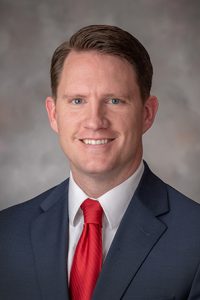State funds would help students with disabilities attend private schools
Parents of children with disabilities could apply for state scholarship funds that they could use at private and parochial schools under a bill heard Feb. 28 by the Education Committee.

LB1251, introduced by Sen. Ben Hansen of Blair, would create a scholarship program for parents of eligible elementary and secondary school students who receive special education services under an individualized education plan or a plan under Section 504 of the federal Rehabilitation Act of 1973.
Hansen said the bill would allow parents of children with disabilities to choose a learning environment that best meets their needs.
To determine the scholarship amount, the state Department of Education would assign students to one of four tiers based on their disabilities. Parents would receive 50 to 150 percent of the current year’s statewide average basic funding per public school student, with parents of higher needs students receiving more funding.
To participate in the program, a school would have to comply with all applicable health and safety laws and conduct background checks on potential employees.
A participating school would not be required to alter its creed, practices, admissions policy or curriculum, and it could accept or deny a student under the program based on its ability to serve the student appropriately.
LB1251 would transfer $5 million in lottery funds to the program each year beginning in fiscal year 2022-23, but Hansen said he is open to other funding methods.
Holly Hansen of Saunders County testified in support of the bill. She said her twin sons, who are in first grade, started kindergarten at a Catholic elementary school in Wahoo, which their older brother attends, but had to transfer to the local public school to receive the special education services they need.
Hansen said she is grateful for the care and support her sons have received in public school.
“However, I should be able to choose the school my children attend, and if my husband and I want to provide a Catholic school environment for my children, they should be able to get that,” she said. “They should be able to receive the special education help they need at any school they attend.”
Leah Critchfield, a special education teacher at Roncalli Catholic High School in Omaha, also testified in support. She said it would allow Roncalli to expand its Benilde Program, which now serves students with mild learning disabilities, to those with more intensive needs.
Currently, students with an IEP are bused to the nearest public high school to receive associated special education services, Critchfield said, but they miss up to two class periods at Roncalli to do so.
“As you can imagine, it doesn’t work,” she said. “Because of this, I’m put in a position where I have to watch parents make a choice and essentially give up the services or leave the school they feel is best for their child.”
Kami Jessop testified in opposition to LB1251 on behalf of several school organizations, including the Nebraska State Education Association and the Nebraska Association of School Boards. She said the bill could undermine students’ access to high-quality educational services and protections they are entitled to under the law.
Jessop said the organizations she represents also are concerned about the proposed tiers that would categorize students based on their disability.
“The assumption that the provision of services or cost of educating a student is in any way associated with their disability label is uninformed, inaccurate and misleading,” she said.
Also in opposition was Connie Knoche of OpenSky Policy Institute. She said LB1251 would provide state funding to private schools without also imposing oversight or accountability measures to ensure that the program is working as intended.
Daniel Russell testified in opposition to the bill on behalf of Stand for Schools. Under Hansen’s proposal, he said, private schools would maintain their ability to discriminate against students based on religion, gender identity, sexual orientation and other characteristics.
“Stand for Schools does not believe that state dollars should be used to support schools that may be closed to some children,” Russell said.
The committee took no immediate action on the bill.

